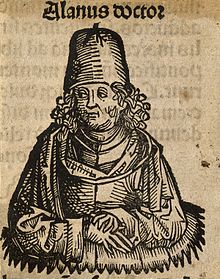Alain de Lille
Alain de Lille | |
|---|---|
 | |
| Born | 1128 Lille, France |
| Died | 1202-1203 |
| Academic background | |
| Alma mater | University of Paris |
| Influences | |
| Academic work | |
| Era | Medieval philosophy |
| School or tradition | Scholasticism |
| Main interests | Philosophy, mysticism, theology, poetry |
Alain de Lille (Alan of Lille) (Latin: Alanus ab Insulis; c. 1128 – 1202/03) was a French[1] theologian and poet. He was born in Lille, some time before 1128. His exact date of death remains unclear as well, with most research pointing toward it being between 14 April 1202, and 5 April 1203. He is known for writing a number of works on that are based upon the teachings of the liberal arts, with one of his most renowned poems, De planctu Naturae (The Complaint of Nature), focusing on human nature in regard to sexual conduct. Although, Alain was widely known during his lifetime, there is not a great deal known about his personal life, with the majority of our knowledge of the theologian coming from the content of his works.[2][3]
As a
Life
Little is known of his life. Alain entered the schools no earlier than the late 1140s; first attending the school at Paris, and then at
He had a very widespread reputation during his lifetime, and his knowledge caused him to be called Doctor Universalis. Many of Alain's writings are unable to be exactly dated, and the circumstances and details surrounding his writing are often unknown as well. However, it does seem clear that his first notable work,
Theology and philosophy
As a theologian Alain de Lille shared in the mystic reaction of the second half of the 12th century against the
Alan's philosophy was a sort of mixture of
Works and attributions
One of Alain's most notable works was one he modeled after
Alain wrote three very large theological textbooks, one being his first work,
Alain de Lille has often been confounded with other persons named Alain, in particular with another Alanus (
In his sermons on capital sins, Alain argued that
List of known works
- De planctu Naturae
- Anticlaudianus
- Rhythmus de Incarnatione et de Septem Artibus
- De Miseria Mundi
- Quaestiones Alani Textes
- Summa Quoniam Homines
- Regulae Theologicae
- Hierarchia Alani
- De Fide Catholica: Contra Haereticos, Valdenses, Iudaeos et Paganos
- De Virtutibus, de Vitiis, de Donis Spiritus Sancti
- Liber Parabolarum
- Distinctiones Dictionum Theologicalium
- Elucidatio in Cantica Canticorum
- Glosatura super Cantica
- Expositio of the Pater Noster
- Expositiones of the Nicene and Apostolic Creeds
- Expositio Prosae de Angelis
- Quod non-est celebrandum bis in die
- Liber Poenitentialis
- De Sex Alis Cherubim
- Ars Praedicandi
- Sermones[4]
References
- ^ Alain de Lille WRITTEN BY: The Editors of Encyclopaedia Britannica
- ^ Zott, Lynn (2003). Classical and Medieval Literature Criticism. Farmington Hills: Gale.
- ^ Wetherbee, Winthrop. "Alan of Lille, De planctu Naturae: The Fall of Nature and the Survival of Poetry". The Journal of Medieval Latin 21 (2011): 223–51. http://www.jstor.org/stable/45019679/
- ^ a b c d Evans, G.R. (1983). Alan of Lille: The Frontiers of Theology in the Later Twelfth Century. Cambridge: University Press.
- ^ a b c d e Marenbon, John (2002). A Companion to the Philosophy of Education. Blackwell.
- ^ Muston, Alexis (1875). The Israel of the Alps: a complete history of the Waldenses and their colonies, Vol. 2. Translated by Rev. John Montgomery. London: Blackie & Son. p. 509.
Alain de l'Isle (Alanus Magnus de Insulis), a celebrated professor of Theology at the University of Paris, towards the end of the twelfth century.
- ^ a b c d Alphandéry 1911.
- ^ Sheridan, James J. (1980). Introduction to The Plaint of Nature. Toronto: Pontifical Institute of Mediaeval Studies.
- ^ A. J. Creighton, Anticlaudien: A Thirteenth-Century French Adaptation (Washington: 1944).
- ^ Andrew Hughes, "The Ludus super Anticlaudianum of Adam de la Bassée". Journal of the American Musicological Society 23"1 (1970), 1–25.
- ^ Evans, G.R. (1981). Introduction to The Art of Preaching. Kalamazoo: Cistercian Publications.
Attribution:
- This article incorporates text from a publication now in the public domain: Alphandéry, Paul Daniel (1911). "Alain de Lille". In Chisholm, Hugh (ed.). Encyclopædia Britannica. Vol. 1 (11th ed.). Cambridge University Press. pp. 467–468.
Translations
- Alan of Lille, A Concise Explanation of the Song of Songs in Praise of the Virgin Mary, trans Denys Turner, in Denys Turner, Eros and Allegory: Medieval Exegesis of the Song of Songs, (Kalamazoo, MI: Cistercian Publications, 1995), 291–308
- The Plaint of Nature, translated by James J Sheridan, (Toronto: Pontifical Institute of Mediaeval Studies, 1980)
- Anticlaudian: Prologue, Argument and Nine Books, edited by W. H. Cornog, (Philadelphia, 1935)
Further reading
- Alain de Lille: De planctu Naturae, ed. Nikolaus M. Häring, Studi Medievali 19 (1978), 797–879. Latin edition of the De planctu Naturae.
- Dynes, Wayne R. 'Alan of Lille.' in Encyclopedia of Homosexuality, Garland Publishing, 1990. p. 32.
- Alanus de insulis, Anticlaudianus, a c. di . M. Sannelli, La Finestra editrice, Lavis, 2004.
- ISBN 978-0521246187.
- Kren, Claudia (1970). "Alain de Lille". ISBN 0-684-10114-9.
- Grant, Arthur Henry (1885). . In Stephen, Leslie (ed.). Dictionary of National Biography. Vol. 1. London: Smith, Elder & Co.
- Summerson, Henry. "Lille, Alain de (1116/17–1202?)". doi:10.1093/ref:odnb/266. (Subscription or UK public library membershiprequired.)
External links
- (Latin) Alanus ab Insulis, Anticlaudianus sive De officiis viri boni et perfecti
- (Latin) Alanus ab Insulis, Liber de planctu Naturae
- (Latin) Alanus ab Insulis, Omnis mundi creatura
- (Latin) Alanus ab Insulis, Distinctiones dictionum theologicalium
- (English) Alain of Lille, The Complaint of Nature. Translation of Liber de planctu Naturae
